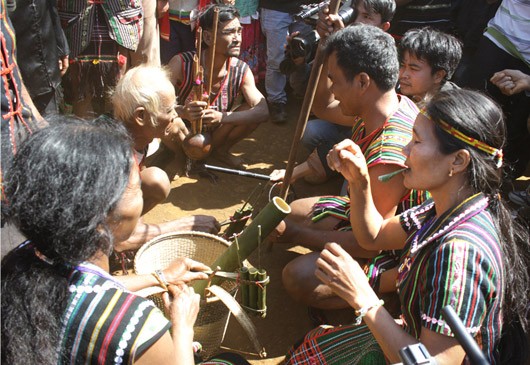(VOVworld) – Due to historical circumstances, many M’nong people in Dak Nong province only have their first name in legal documents because they do not know their surnames. Females and males are distinguished by middle names such as Y, Dieu, K, H, or Thi, thus M’nong do not know their clan. In 2010, Dak Nong province started building a scientific project to identify the surnames of M’Nong people.
 |
| A family get-together of M’Nong ethnic people in Dak Nong province. (Photo: baomoi.com) |
After several years of implementation, the project has received a positive response from local people.
Ms. H’Oanh from Cu Jut district, Dak Nong province, said: “The identification of surnames is so meaningful to us, and can prevent consanguineous marriage. In 3 villages in the district, there are many clans such as B’Krong, Ya, Ktul, Knul, Ayun, or Preng. Some surnames are identified based on geography or natural conditions.”
In Ea Tling town, more than 300 people have been given surnames. Le Quang Ngoc, in charge of birth registration in Ea Tling town, Cu Jut district, said: “The people are given detailed guidance in the procedure for carrying out surname identification. The children are now literate, so they can help their parents to fill the registration form. According to local custom, the first name is written first, followed by the surname.”
Since the project has been implemented in Dak Nong in 2010, to date more than 1,000 M’Nong people have been given full names. But the naming is mainly for newborn and children at school-age. Only a few adults have made such a change because it may affect numerous other legal documents.
Dieu Kre of Bu Bia hamlet in Dak Rlap district said: “Each clan has a family name. We hope the Party and state will pay more attention to our issue although we now have the project to identify family name for M’Nong people. The point is that making such a change is too complicated and influences many legal documents including family record books and certificates. My name is Ya Kre, but not Dieu Kre as an example.”
M’Nong ethnic group has a total of 40 clans. Each relates to stories, legendaries, geographical names, and natural phenomena.
According to Ha Thi Hanh, head of the provincial ethnic affairs department, “The department has counseled the project’s implementation because, first, local people want to remember their source. Second, the naming is useful for their children to attend school. Third, it’s good for the management of births, marriage, and death records. After reviewing the achievements and restrictions, we’ll work with the justice department to continue and expand the project to help the local understand the importance of preserving the traditional cultural characters and writing their family names.”
Dak Nong authorities are conducting a survey to gather assessments of beneficiaries across the provinces to outline more practical solutions to implement the project.